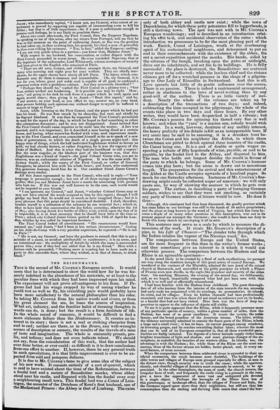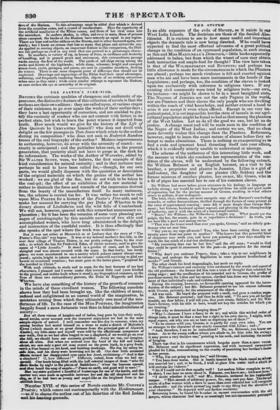THE HEIDENMAUER.
THIS is the second of Mr. COOPER'S European novels. It would seem that he is determined to show the world how far he was for- perly indebted to the abundance of his materials, or at least to the peculiar force with which they had been impressed upon his mind The experiment will not prove advantageous to his fame. If Pe- gasus had had his wings cropped by way of seeing whether he 'could trot as well as fly, his crambling pace would probably have been more satisfactory to the natural philosopher than his rider. In taking Mr. COOPER from his native woods and rivers, or from his great element the sea, he loses the source of inspiration. "What art, industry, and the familiar habit of dressing thoughts in words can do, is done; but the result is a form destitute of life. tn the whole round of romance, it would be difficult to find a more elaborate failure than the Heidenmauer. It creates no in- terest in its story ; there is not a real or striking character from end to end; neither are there, as in the Bravo, any well-wrought 'scenes of description or scenery, the results of the travels of a man of taste and imagination. The whole is eminently prosaic, pro- lix, and tedious; and does not even indicate talent. We should not say, from the consideration of this work, that the author had ever done better, or ever could: so difficult is it to draw conclusions from one effort to another. lf, however, there be any general truth "hi such speculations, it is that little improvement is ever to be ex- pected from cold and pompous dulness. It is due to Mr. COOPER'S fame to give some idea of the subject of his new work. It consists entirely of a sort of quarrel, which is said to have existed about the time of the Reformation, between a feudal lord and a society of Benedictine monks, whose abbey stood near his castle, and disputed with him the feudal sway over a neighbouring small town. This feudal lord was a: Count of Lein- ingen, the ancestor of the Dutehess of Rent's first husband, one of the Mediatized Princes : the Abbey is that of Limburg. The phis
•
only of both abbey and castle now exist ; while the town of Duerckheim, for which these petty potentates fell to loggerheads, is still a thriving town. The spot was met with in Mr. Cociaaa's European wanderings ; and is described in an introduction relat- ing his vitit to it, and accidental observation of the ruins : which introduction we pronounce to be far the most pleasing part of the work. Emich, Count of Leiningen, wroth at the overbearing spirit of his ecclesiastical neighbours, and determined to put an end to their encroachments with the existence of the abbey, fits out a secret expedition against the monks. His bands, aided by the citizens of the burgh, breaking open the gates at midnight, drive out its inhabitants, and set fire to its buildings. He is fully successful : the place is destroyed, the Benedictines are scattered never more to be collected; while the lawless chief and the riotous citizens get off for a wretched penance in the shape of a pilgrim- age to Our Lady of Einsedlin in Switzerland. And this is all. Love spreads but little of its gentle influence over the scenes. There is no passion. There is indeed a matrimonial arrangement, rather in obedience to the laws of novel-writing than by any good-will of the author. There is as little variety of inci- dent. Nearly the whole of the volumes are taken up by a description of the transactions of two days; and indeed, subtracting the time occupied in the pilgrimage, the whole of the events take place in two days and three hours. By any other writer, they would have been despatched in half a volume ; but Mr. Coormes passion for spinning his thread very fine is well known; and when the " yarn is a marine one, nobody would wish it shorter. In a work, however, destitute of any earthly interest, the heavy prolixity of his details is felt as an insupportable bore. M any scene may be said to be amusing, it is a drunken bout be- tween the Count and his neighbour the Abbot, in which three Churchmen are pitted to drink against three inmates of the castle, the Count being one. It is a sort of double or quits wager re- specting a tribute of fifty hogsheads of wine, payable, or said to be payable, by the feudal load to the Abbey, and disputed by him. The man who holds out longest decides the result in favour of the party to which he belongs. Some of Mr. COOPER:S humour comes into play here ; but the scene is drawn out to monstrous length. The preparation for the arrival and this entertainment of the Abbot at the Castle occupies upwards of a hundred. pages. So much for one Saturday afternoon. Instances of Mr. COOPER'S fine- drawing might easily be collected usque ad nauseam: we will only quote one, by way of showing the manner in which he gets over his paper. The author, in describing a party of lounging German soldiers, wishes to say that they were not smoking, as certainly any party of German soldiers at leisure would be now. He does it thus— Although this continent had then been discovered, the goodly portion which has sine fallen to our heritage was still in the hands of its native proprietors; and the plant so long known as the weed of Virginia, but which has since be- come a staple of so many other countries in this hemisphere was not in its present general use amongst the Germans ; else would it have been our duty to finish this hasty sketch by enveloping it all in mist.
This sentence may serve as a scale by which to measure the di- mensions of the work. It rivals Mr. GODWIN'S description of a pipe, in his Life of Chaucer—" The slender tube through which the Indian inhales the vapour of the Nicotian weed," &c. The comparisons between Europe and the United States, are far more frequent in this -than in the writer's former works ; and they sometimes give an interest to it which it would not otherwise possess. The comparison between the Hudson and the Rhine is an agreeable specimen-
Ia the mood likely to be createdby a flood of such recollections, we pursued our way along the southern margin of this great artery of central Europe. We wondered at the vastness of the Rheinfels, admired the rare lewd of the ruined church at Baccarach, and marvelled at the giddy precipice on which a Prince of Prussia even now dwells, in the eagle-like grandeur and security of the olden time. On reaching Mayence, the evening of the second day, we deliberately, and, as we hoped, impartially compared what had just been seen with that which is so well and so effectually remembered. I had been familiar with the Hudson from childhood. The great thorough- fare of all who journey from the interior of the state towards the sea, necessity had early made me acquainted with its windings, its promontories, its islands, its cities, and its villages. Even its hidden channels had been professionally examined, and time was when there did not stand an unknown seat on its banks, or a hamlet that had not been visited. Here then was the force of deep im- pressions to oppose to the influence of objects still visible.
To me it is quite apparent thatthe Rhine, while it frequently possesses more of any particular species of scenery, within a given number of miles, than the Hudson, has none of so great excellence. It wants the variety, the mobk beauty, and the broad grandeur of the American stream. The latter, within the distance universally admitted to contain the finest parts of the Rhine, is both a large and a small river ; it has its bays, its narrow passages among meadows, its frowning gorges, and its reaches resembling Italian lakes; whereas the most that can be said of its European competitor is, that all these wonderful-pecu- liarities are feebly imitated. Ten degrees of a lower latitude supply richer tints, brighter transitions of light and shadow, and more glorious changes of the at- mosphere, to embellish the beauties of our western clime. In islands, too, the advantage is with the Hudson ; for, while those of the Rhine are the most nu- merous, those of the former stream are bolder, better placed, and, in every na- tural feature, of more account.
When the comparison between these celebrated rivers is extended to their ar- tificial accessaiies, the result becomes more doubtful. The buildings of the older towns and villages of Europe seem grouped especially for effect, as seen in the distant view, though security was in truth the cause; while the spacious, cleanly, and cheerful villages of America must commonly be entered, to be ap- preciated. , In the other hemisphere, the maze_ of roofs, the church towers; the irregular faces of wall, and frequently the castle rising to a pinnacle ill the rear, give a town the appearance of souse vast and antiquated pile devoted to a single object. Perhaps the -boroughs of the -Rhine have less of this picturesque, or landscape effect, than the villages of France and Italy, for the Germans regard :mace more than their neighbours, but still are they leis commonplace than the smiling and thriving little marts that crawl the btu- dere of the Hudson. To this advantage must be added that which is derived from the countless ruins, and a crowd of recollections. Here the superiority of the artificial auxiliaries of the Rhine ceases, and those of her rival come into the ascendant. In modern abodes, in villas, and even in seats, those of princes alone excepted, the banks of the Hudson have scarcely an equal in any region. There are finer and nobler edifices on the Brenta, and in other favoured:spots, cer- tainly; but I know no stream that has so many that please and attract the eye. .As applied to moving objects, an important feature in this comparison, the Hud- son has perhaps no rival in any river that can pretend to a picturesque charac- ter. In numbers, in variety of rig, in beauty of form, in swiftness and dexterity 'of handling, and in general grace and movement, this extraordinary passage ranks among the first of the world. The yards of tall ships swing among the rock.s and forests of the highlands; while sloop, schooner, bright and canopied steam-boat, yacht, periagua, and canoe, are seen in countless numbers, decking eits waters. There is one more eloquent point of difference that should not be :neglected, Drawings and engravings of the Rhine lend their usual advantages, softening, and frequently rendering beautiful, objects of no striking attractions -when seen as they exist; while every similar attempt to represent the Hudson, at once strikes the eye as unworthy of its original.



























 Previous page
Previous page